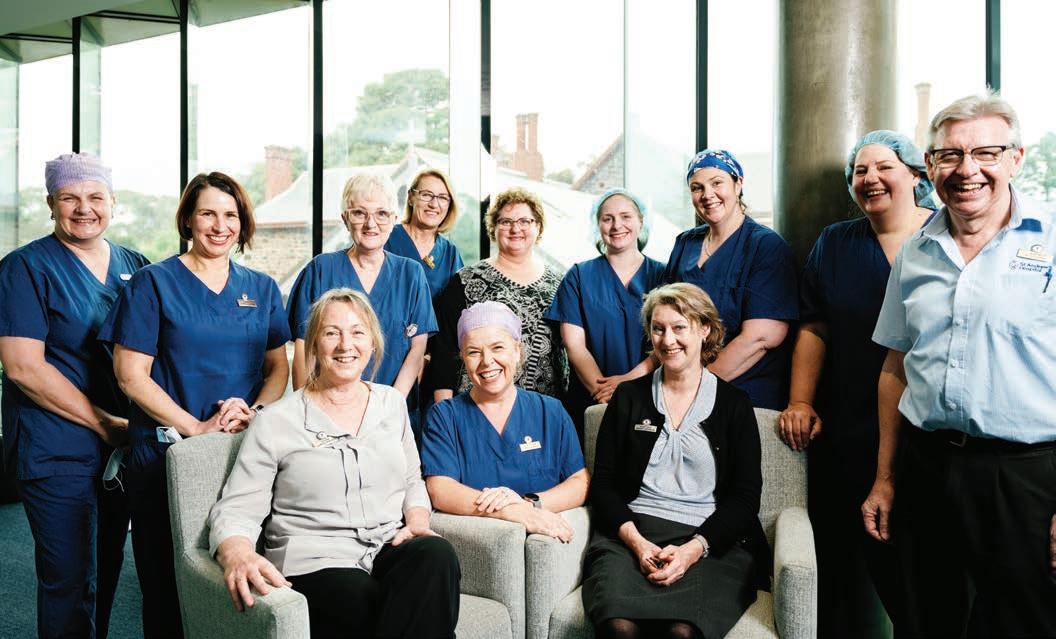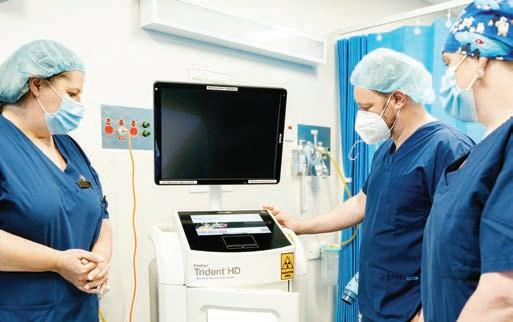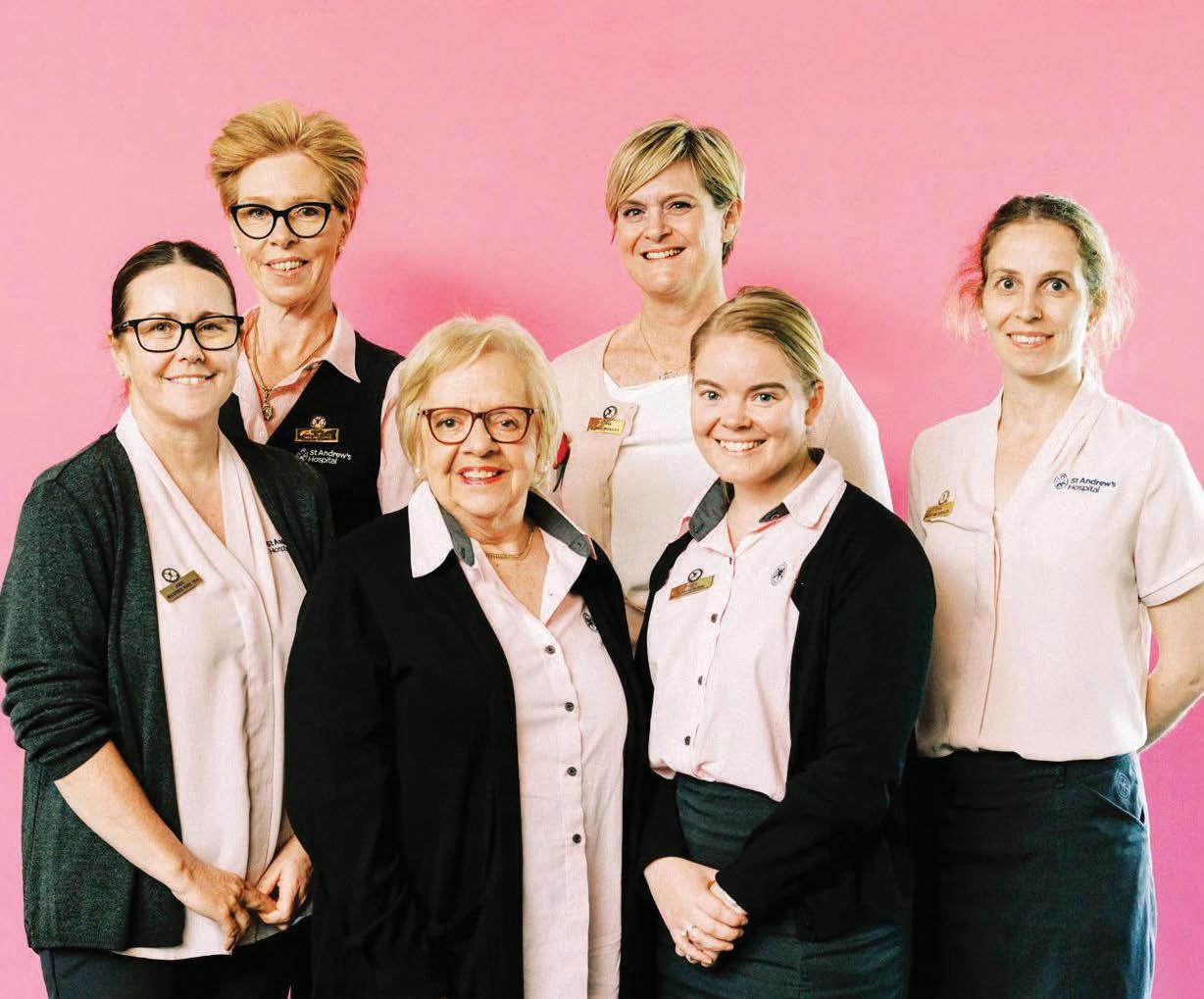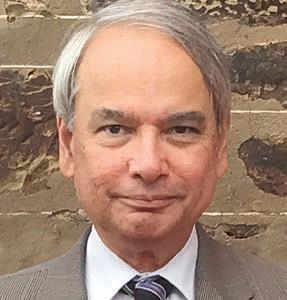
11 minute read
Nursing and Clinical Services
Clinical Education
Once again, we are very pleased to report that our Graduate Nurse Program continues to train, support, mentor and coach a number of high-performing newly registered nurses committed to delivering quality care to our patients. In 2022, 31 graduate nurses commenced their Transition to Professional Practice Program at St Andrew’s, an increase from 17 the previous year.
With the current healthcare sector challenges faced by all hospitals during the pandemic, St Andrew’s took this opportunity to boost the hospital’s nursing workforce.
The first group of graduate nurses launched their careers at St Andrew’s on 10 January 2022. Our final graduate commenced on 30 May 2022. As always, the ethos of St Andrew’s was evident as staff across each area welcomed and supported the new nurses as they settled into their teams.
The perioperative education team expanded this year, recruiting another two educators from our senior staff cohort. The team introduced a highly structured eight-week orientation program to assist the newly registered perioperative nurses to make the transition to an independent, beginner level practitioner.
The graduates’ rosters mirrored that of their designated area educator, allowing daily clinical immersion time and attendance at lectures, practical sessions and in-services.
The graduates met as a group once a week to support each other, debrief about critical incidents and share learning moments experienced during the previous week. They then set their weekly goals before returning to their clinical area.
As the recovery and anaesthetics graduates swap places mid-year, a similar, yet shorter transition model will be implemented.
Eight weeks into the perioperative program, a detailed evaluation was conducted and found that all graduates agreed they felt supported in their transition to professional practice and were provided with the skills required to perform their beginner role. This supportive approach will be continued within the perioperative environment in 2023.
The clinical team on the wards also supported their graduate nurses by mirroring the rosters of a nursepreceptor for the first month. After the first three-to-four weeks, the graduates made the following comments:
‘The GNP Coordinators have been extremely supportive in helping me to transition into my first nursing job.’
‘A very well-supported program; very supportive nurses and Clinical Manager.’
‘We really appreciate the CCU nurses who have checked in on us and our progress throughout our first month.’ ‘ Transitioning from a student nurse to a Registered
Nurse can be a daunting time, but the support I have received as a GNP from the staff has been amazing, and I feel so comfortable after only a few weeks.’
The Graduate Coordinator and clinical educators on the wards and units touch base frequently with the graduates, providing an opportunity for them to discuss their progress, set goals, and clarify clinical protocols. The ward study program of five full days is changed to reflect the needs of the graduate nurses each year. This year, focus was on growing the different skills and knowledge for each graduate in their respective specialty areas.
The 2021 graduate nurses completed their course in early 2022. Each graduate completed a range of skills assessments and workbooks that complimented their clinical training objectives. The program culminates in each graduate presenting to their peers and clinical managers. The quality of their work is impressive, with each nurse demonstrating a mature understanding of policy and well-developed links between Safety and Quality theory and practice. The assignment requires the graduates to demonstrate how risk screening on admission, followed by ongoing assessments throughout the patient journey at St Andrew’s, enables the nurse, in collaboration with the Healthcare team, to design, implement and evaluate individual nursing plans of care aimed at achieving each person’s healthcare goals. Congratulations to the graduates for exceptional work.
In-service and Ongoing Education
The clinical educators coordinated workshops on a variety of topics to ensure nurses are abreast of the latest evidenced-based practice and protocols. These workshops included:
• Orthopaedic procedures, including anaesthetic management mobilisation, wound management and surgical techniques. • ICU renal dialysis allowing nurses to hone their skills on setting up and maintaining an effective dialysis circuit on the critically ill patient. • Management of chest pain to ensure patients receive immediate review and timely interventions. • Negative pressure wound therapy that has been shown to enhance wound healing and decrease the patient’s discomfort and need for frequent dressing changes. • Intravenous cannulation to facilitate timely treatment for patients requiring intravenous therapy and medications essential for their care. • Male urethral catheterisation. • Communication with patients about their pain management needs. • Magnetic resonance imaging (MRI) safety. • Managing chest drains.
In addition to the clinical education program for all clinical areas, we have maintained a focus on infection control given the COVID-19 environment across the state. We have ensured staff are well versed in the areas of hand hygiene, and the donning and doffing of personal protective equipment to ensure patient safety is maintained at the highest level.
Staff have attended a number of conferences, which have included:
• International Forum on Quality and Safety in HealthCare • ACORN Conference • Professional and Social Responsibility for
Health Leaders • Patient Journey Mapping
Online Learning
Online learning has become an integral part of our education program during the pandemic. Many clinical courses were made available to our staff, expanding their knowledge base at a time that is convenient to them. Over 6,000 courses were completed by the St Andrew’s staff throughout the year. Examples of the clinical courses available include: Delirium and Cognitive Impairment, Pressure Injury Prevention, Advance Care Directives, Arterial Blood Gas Analysis, Clinical Transfusion Practice, Hand Hygiene and Donning and Doffing PPE.
Mandatory Training
St Andrew’s continually maintains impressive statistics that demonstrate staff remain skilled in all mandatory training requirements. This includes Advanced Life Support for both adults and paediatrics, as well as Basic Life Support. A Laerdal Advanced Resuscitation manikin, funded by the St Andrew’s Hospital Foundation, has increased the simulation capabilities within our high acuity areas. Training is as realistic as possible, with the ability to incorporate real time use of the hospital’s new defibrillators, enabling staff to be confident in their use and prepared should an emergency arise.
In November 2021, in collaboration with the University of Adelaide, we appointed Dr Page in the role of Professor of Nursing, Innovations in Quality and Safety, an inaugural appointment to support the hospital’s safety and quality initiatives. Since commencing, Dr Page has engaged with nursing staff to participate in innovation and research opportunities. Utilising literature searches and evidence-based policy development, some topical projects have commenced, including:
Breast Cancer Care
• Article regarding support provided to our breast cancer patients by our Breast Care Team. Page, T. (2022)
Solidarity, support and acceptance: a celebration of the person, not the disease, Supportive Care in Cancer. • Scoping review in progress to identify what supports are available for breast cancer patients’ post-surgical treatment to enhance their quality of life and self-image. • Questionnaires to be conducted using the
International Consortium for Health Outcome
Measurement (ICHOM) International Data collection
QoL and body image survey tools, which will also allow us to internationally benchmark. • Supporting People with Cancer Grant application to be completed to reduce the impact of and better support people affected by breast cancer.
South Australian Inpatients Diabetes Survey (SAIDS)
11-15 July was National Diabetes Week; 10.7% of St Andrew’s inpatients on 15 July had a diabetes diagnosis. The SAIDS was approved by the St Andrew’s Human Research and Ethics Committee (SAHREC) and was conducted to assess the bedside care for patients with diabetes in South Australian hospitals, to explore the patients’ experience, and to understand the current hospital workforce availability. The full South Australian report and St Andrew’s individual report will be completed in August.
Parastomal Hernia
A St Andrew’s stomal therapy nurse, Fiona Bolton, is an investigator in a project aiming to develop a National Risk Assessment tool for prevention of parastomal hernias in ostomates, aimed at improving care and quality of life. This is subsequent to Fiona’s involvement in the National Survey of 156 stomal therapy nurses and 10 ostomates (people with an ostomy). SAHREC approval was gained for this retrospective case note review and Dr Page and Fiona will be conducting this alongside of their Northern Adelaide Local Health Network (NAHLN) peers.
Blood Management Committee Grant
Kathy Humphries is heading a review of blood management usage in urology surgical patients and any associated thermoregulation characteristics. Dr Page is assisting with literature searches and data analysis. Additional research opportunities will be reviewed post the completion of this study and a journal article is in progress.
Research
A survey will be released in the next month to all members of the nursing division, challenging our current practice and looking for innovative ideas to continue providing medical and surgical excellence to our consumers. Dr Page is looking forward to receiving the completed surveys which will enable her to provide support and direction to team members.
New Position: Theatre Resource Manager
This year, we made further investment in our people and processes within theatres with the introduction of the Theatre Resource Manager (TRM). The TRM ensures efficient and cost-effective utilisation and allocation of theatre staff, equipment and consumables for allocated theatres. This role is accountable for operational clinical nursing care decisions in the theatres on a dayto-day basis at the point of care. The TRM acts as a resource person to ensure nursing activities within the theatre suite are undertaken in a safe, competent and professional manner.
Continuity of staffing in line with their specific skillset has and will continue to prove invaluable since this role was established. This is especially true with COVID-19 creating additional pressures for our workforce.
Capital Equipment
This year, there were many capital equipment purchases made to support our patient outcomes specific to their care in theatres. Three large capital purchases of note are:
1. Trident HD System
St Andrew’s Hospital is recognised within the state for breast cancer treatment and surgeries. In respect to these surgeries, there is nothing more important than having accurate information to support clinical practice. Thanks to the additional generous donation of Ros and Peter Griffiths through the St Andrew’s Hospital Foundation, the hospital acquired not one, but two new Trident HD Systems for use in our operating rooms. This next-generation solution taps the power of Hologic’s proven detector technology to generate sharp, highly detailed images for rapid sample verification right in the theatre at point of care, enabling the surgeon to more easily identify the tissue that needs to be removed due to disease. This all occurs in the operating theatre without transporting breast specimens for identification, subsequently reducing theatre time for the patient.
2. Fluoroscan Insight Mini C-Arm
Due to increasing demand for in operating room imaging, St Andrew’s this year purchased an additional Fluoroscan Insight Mini C-Arm. The Mini C-arm Extremities Imaging System is designed specifically for operating rooms providing options for imaging across multiple clinical specialties. It facilitates greater positioning, flexibility and convenient mobility and its efficient design produces outstanding image quality and, subsequently, best patient care.
3. Midas Rex MR8 Upgrade
St Andrew’s has very recently undertaken an evaluation process, with assistance from our Visiting Medical Officers, to decide a model for upgrading our fleet of medical drills. The MR8 Midas Rex system is the newest high speed drill platform with a lower operating temperature, less chatter, improved visibility of the surgical site, and better cutting performance. The recent purchase of seven MR8 sets will allow this precision system to be within our surgeons’ hands for continued improved patient outcomes within the operating theatre.


Breast Care Team: Outstanding Recognition
At St Andrew’s, we all understand that breast cancer is the most common cancer affecting Australian women, with 20,000 diagnosed annually. Our cancer service is the most comprehensive private cancer facility in South Australia, offering patients of the hospital – as well as patients of our affiliated surgeons – the medical expertise, innovation and care expected from a centre of excellence. This significant resource, our excellent partnerships, and our exceptional Breast Care team make the St Andrew’s Breast Clinic staff stand out from our peers. This is reinforced with the announcement that the St Andrew’s Breast Care Team has been nominated, yet again, and reached the finals of the SA Health and Midwifery Excellence Awards for 2022. The team has now been recognised as a provider of excellence in healthcare five times in the last six years the Awards have been held. An outstanding achievement for the team and for St Andrew’s as a whole.

Vale Dr Chiron Bartholomeusz
Our dear friend and colleague, Dr Chiron Bartholomeusz passed away on 23 May 2022. Chiron was a consultant physician at St Andrew’s for well over 20 years.
He chaired our Mortality and Morbidity Committee and was a member of our Medical Advisory Committee. Chiron was a highly regarded and well respected member of the St Andrew’s and broader medical community, and he will be greatly missed.








